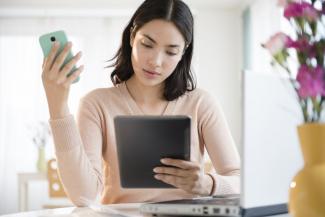
Do the preparation task first. Then listen to the audio and do the exercises.
Preparation
Transcript
Presenter: So, we're back in the studio. Welcome back, everyone. My name's Rick Walker. From our laptops to our televisions, from the displays on our smartphones to those on our satnavs, we are in front of screens all the time. Have you ever wondered what it would be like to disconnect completely? To choose not to have access to the internet? If you have, you may be in need of a digital detox – a total switch-off from all things digital. The idea of people taking a digital detox is becoming more and more popular, especially amongst young people – and today we're joined by someone who's tried a number of digital detox activities and is here to give us some advice about it. Amanda Vince, welcome to the studio.
Amanda: Thank you very much.
Presenter: So, Amanda, you work for a fashion magazine in London, right? I guess your work means you need to be online a lot.
Amanda: Oh, yes. Apart from the hundreds of emails I get every day, I'm always browsing fashion websites, as well as online videos. I also need to be very active online, especially on Twitter and Instagram – sharing what we're doing in the magazine, interacting with designers, photographers, influencers … it never stops, literally. Then of course there's my friends and family to keep in touch with online too, and for me, my work grew out of my passion, so friends and work colleagues aren't two totally separate groups of people and it all gets a bit messy online sometimes. I think I'm online for at least 12 hours a day.
Presenter: So, how did you get the idea for a digital detox?
Amanda: I read a book about it, called Log Off: How to Stay Connected after Disconnecting. The author's name is Blake Snow. That book gave me some really good advice and made me think about trying to change some of my digital habits. I started with removing distraction.
Presenter: What do you mean by that?
Amanda: That means turning off alerts, buzzes, alarms or notifications of any kind. I had notifications set up for everything, and it meant I was always being forced to look at my phone. Removing all of them except for important contacts helped me focus immediately. The book also made a really good point, that we should ask ourselves 'Why?' every time we take out our phone. I realised that most of the times I looked at my phone were because I was trying to avoid or ignore something else happening right in front of me. It was an automatic habit.
Presenter: I have to confess, that happens to me too. But what else are you going to do when you're standing in line at the bank or waiting for your train?
Amanda: OK, yes, I'm the first to admit that it's great for helping time go by. But speaking personally, I found I wasn't just checking my phone to kill time when I was alone. I was also doing it with friends or family around.
Presenter: Hmmm … right. Well, so far, this doesn't sound too drastic. Turning off notifications and becoming aware of when we use our devices. That sounds easy.
Amanda: Yes, it's the first step. Once we begin to realise just how much of a grip our devices have on us, then we're ready to really take the next step. First, my partner and I did a weekend with absolutely no screens. She found it easier than I did. For me, it was a little bit scary at first but it turned out to be a pretty rewarding experience.
Presenter: A whole weekend, huh? I don't know if I could ...
Amanda: I think everyone has to do this at their own pace. If a weekend feels too much, maybe just try for an evening. Then work your way up to more. I guarantee, once you've tried it, you'll want to try it again. We're going to try for a whole week in the summer.
Presenter: OK, let's pause there then and see what our listeners have to say. You can call us here directly, or send us a message on any of our social media channels ... oops, should I be saying that? Anyway, more after the break.




Hi yoyoraw,
I don't think a comma is essential, but I think it would help to make the sentence easier to read and would improve the style. You could put a comma between life and since, or between phone and and.
Commas are often used in this way. They help to break up the sentence and guide the reader as to where the sense units are. In speech we do this with pauses and changes of tone. On the page we use punctuation to achieve it.
Peter
The LearnEnglish Team
Hello TDP
We strive to produce the best quality content that we can, and so of course we are very pleased to know that you found this page useful and that you'll recommend it to your students.
I wanted to mention that LearnEnglish Teens and LearnEnglish Kids might also be of use to your students if they are not adults, or perhaps to their children if they have any at home these days.
All the best
Kirk
The LearnEnglish Team